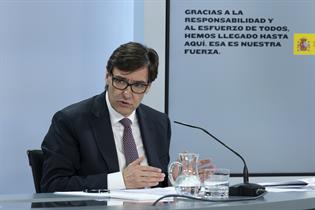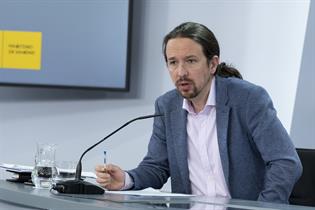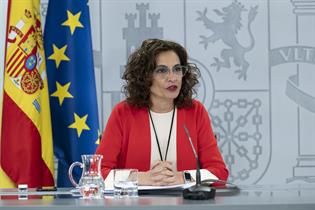Council of Ministers
Government regulates new normal after coronavirus pandemic
Council of Ministers - 2020.6.9
Moncloa Palace, Madrid
The Council of Ministers approved a Royal Decree-Law on urgent prevention, contention and coordination measures to tackle the health crisis caused by COVID-19.
The Minister for the Treasury and Government Spokesperson, María Jesús Montero, explained that these measures will govern once the state of emergency and the de-escalation process is over, on 21 June. As from Monday, she recalled, 52% of the population (some 25 million people) are in Phase 3, the last phase before the new normal.
María Jesús Montero insisted that the virus will remain a threat to our society until an effective treatment or vaccine is discovered, and hence we must continue to take precautions and "not drop our guard, or act as if we think everything is over and that we are safe".
The Minister for Health, Salvador Illa, specified that the law approved on Tuesday will remain in force until the government makes a grounded declaration of the end of the health crisis, after listening to the regional health authorities at the Inter-territorial Council of the National Health System and following a prior report from the Health Alerts and Emergencies Coordination Centre.
Prevention, early detection and a prepared health system
 Pool Moncloa/Borja Puig de la BellacasaSalvador Illa pointed out that some of the measures are not new, but extend those adopted during the state of emergency, such as those on prevention and hygiene which, he reiterated, are key for halting the spread of the virus.
Pool Moncloa/Borja Puig de la BellacasaSalvador Illa pointed out that some of the measures are not new, but extend those adopted during the state of emergency, such as those on prevention and hygiene which, he reiterated, are key for halting the spread of the virus.
Specifically, he referred to the cleaning of public and private spaces, the frequent washing of hands, maintaining social distancing of at least 1.5 metres and the compulsory use of face masks in public thoroughfares, in the open air and in interior public spaces, as well as on transport. Henceforth, on land and air means of transport, operators that work with pre-assigned seats will have to conserve passenger records for a minimum period of four weeks, highlighted Salvador Illa, "to guarantee the traceability of contacts in the event of positive cases".
There will also be continuity in the obligations on the collection, processing and forwarding of information on the disease to the Ministry of Health by all regional health operators. Salvador Illa stressed the importance of early detection and of epidemiological surveillance to get ahead of any subsequent outbreak, and in the event of this happening, guarantee the capacity of the health system to tackle it swiftly.
Accordingly, the law specifies the resources necessary for health professionals, the availability of beds and the obligatory nature of introducing contingency plans and of carrying out PCR diagnostic tests or similar tests as soon as possible for any suspicious cases. As regards care homes for the elderly, it is established that they must be coordinated with the health centres in their respective regions and have specific plans drawn up to tackle any subsequent outbreaks.
The Spanish Medication and Health Products Agency, with the aim of guaranteeing the availability of whatever may be needed to tackle the coronavirus, may gather information from manufacturers on their scheduled production and establish priorities. In addition, and exceptionally, it will be empowered to grant preliminary licenses on the functioning of installations to guarantee the manufacture in Spain of health and medical products.
As regards sport, the preventive measures to be adopted at the Professional Football League and ACB League events will be established by the National Sports Council, following talks with the organisers of the two competitions, regional governments and the Ministry of Health.
Protection of children and adolescents
 Pool Moncloa/Borja Puig de la BellacasaThe Second Vice-President of the Government and Minister for Social Rights and 2030 Agenda, Pablo Iglesias, presented the draft Constitutional Law on the Comprehensive Protection of Children and Adolescents from any Form of Violence, which was approved by the Council of Ministers for its passage through Parliament.
Pool Moncloa/Borja Puig de la BellacasaThe Second Vice-President of the Government and Minister for Social Rights and 2030 Agenda, Pablo Iglesias, presented the draft Constitutional Law on the Comprehensive Protection of Children and Adolescents from any Form of Violence, which was approved by the Council of Ministers for its passage through Parliament.
Pablo Iglesias highlighted that this new legislation has been developed by several governments of different political hues and called for parliamentary groups to introduce improvements during its passage through Parliament so that it can be approved with a broad consensus. "Ideologies do not need to be separated when introducing a law that protects boys and girls and adolescents in Spain from violence".
Child abuse causes tremendous suffering for children with long-term consequences conditioning adult life and, by approving this law, claimed the Second Vice-President of the Government, Spain responds to a major social demand, to the Constitution and to its international obligations on the defence of the rights of children and adolescents.
Pablo Iglesias underlined that the comprehensive approach of the new legislation, which sets a paradigm in common protection throughout the State, prioritises preventive measures at an educational, family, institutional, social services, advertising, social media and criminal law level.
Noteworthy features of future law
Pablo Iglesias specified that the new legislation establishes that citizens must notify the authorities immediately of any sign of violence perpetrated against boys, girls or adolescents, given that this is not a private problem, but in fact a social one.
The new law introduces the figure of the social well-being and protection coordinator at education centres to ensure the smooth functioning of the protocols for action to tackle any indicia of bullying, sexual harassment, cyber-bullying, gender-based violence, self-harming and any other form of violence. Sports and leisure institutions attended by minors will also have a similar figure introduced.
The law guarantees the universal access by minors to health services of treatment and rehabilitation. Centres that protect minors in care will establish specific protocols on prevention for the early detection of possible cases of abuse, sexual exploitation or trafficking.
The Second Vice-President of the Government announced that cyber-bullying through the social media will be tackled with new instruments. In this regard, the new legislation regulates a specific channel for reporting incidents to the Spanish Data Protection Agency and establishes the rapid removal from the Internet of content against minors.
Pablo Iglesias also indicated that the future legislation offers specific training on the fundamental rights of the child and adolescents to those professionals in habitual contact with children, including judges and prosecutors, and specialised units will be set up within all State law enforcement agencies.
The new law recognises the right to free legal aid for minors and prevents children under the age of 14 or with disabilities from having to declare on repeated occasions.
The text also incorporates a new regulation on hate crimes, including age (boys, girls and adolescents, the elderly, etc.) as a ground for discrimination. And this includes aporophobia and social exclusion as criminal offences.
Pablo Iglesias stated that the statutory period of limitations for the most serious offences committed against minors will begin to run when the victim is 30 years of age.
The Second Vice-President of the Government also highlighted that the law establishes the deprivation of parental authority as obligatory for those convicted of murder or manslaughter in the event that the aggressor and the victim had a child in common or when the victim was a child of the aggressor. "A chauvinistic murderer can never be a good father and hence should not be entitled to hold parental authority".
The new legislation also bans advertising which, due to its characteristics, can provoke violent conduct in minors against themselves or against others, or which includes stereotypes of a sexist, racist, homophobic or transphobic nature.
The Second Vice-President of the Government thanked the ministerial departments involved for their work in drafting the law, social services and NGO workers and those of groups that defend the rights of children. He also made special mention of the pianist James Rhodes, who suffered abuse as a child, for the backing he gave to the law.
Protect boys and girls and guarantee a better society
 Pool Moncloa/Borja Puig de la BellacasaMaría Jesús Montero advocated defending the rights of boys and girls, their well-being and their development, and guaranteed "zero tolerance of abuse, violence and impunity". The minister claimed that "protecting today's boys and girls means guaranteeing a better society now, but especially in the future".
Pool Moncloa/Borja Puig de la BellacasaMaría Jesús Montero advocated defending the rights of boys and girls, their well-being and their development, and guaranteed "zero tolerance of abuse, violence and impunity". The minister claimed that "protecting today's boys and girls means guaranteeing a better society now, but especially in the future".
In this regard, María Jesús Montero once again declared the government's commitment to the fight against child poverty. The minister pointed out that the goals of the Minimum Living Income include alleviating this problem, and highlighted the figure that children live in half of the households of the first beneficiaries - 255,000 people - who will receive this benefit on 26 June.
The third pillar that allows a life project to be developed "regardless of the place of origin or the family in which they are born", said the Government Spokesperson" is a robust public education system, which facilitates integration and contributes to equal opportunities. To that end, she continued, the government has decided to allocate 2 billion euros to education of the 16 billion euros under the COVID Fund which will be transferred shortly to the regional governments.
Reduction in greenhouse gases
The Council of Ministers agreed to submit for its passage through Parliament the draft law regulating the regime for the trade in greenhouse gas emissions allowances.
The figure of the emissions allowance is an authorisation to emit one tonne of CO2 equivalent that can be bought or sold, and is the basis for a market system that allows for the regulation of greenhouse gas emissions from industry, the electricity generation sector and air transport.
The Government Spokesperson explained that this draft law amends the current law to adapt it to the new targets for the reduction of emissions that the European Union has set as a contribution to the Paris Agreement, and which is set at least 40% lower in 2030 than the figure for 1990.
María Jesús Montero argued that this draft law, together with the Circular Economy Strategy, the Royal Decree on Waste Transfer, and the draft Bill on Waste and Contaminated Land, all recently approved, show that the COVID-19 crisis has not diverted the government from the fight against climate change, one of the priorities on its agenda. "The change to a more sustainable and environmentally respectful productive system is an opportunity to strengthen our productive fabric and Spain will not miss the green revolution train".
Non official translation





